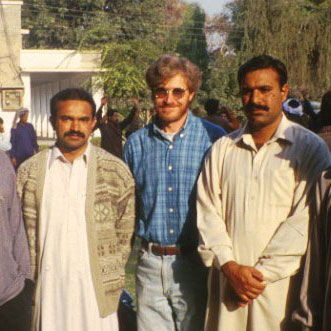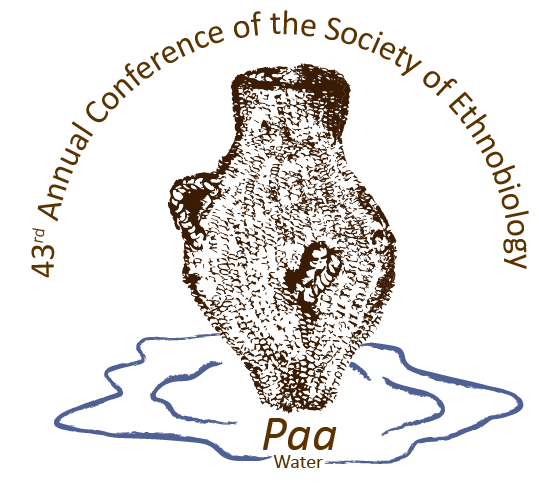Winter 2020
Ethnobiology Newsletter

Society of Ethnobiology Member Newsletter
Message from the PresidentWelcome to our Winter Newsletter. Let me begin by expressing my sincere condolences to members on the passing of Steven Weber, Society co-founder (along with Steve Emslie), and treasured friend and mentor to many of us. We learned a few years ago that Steve was diagnosed with ALS, and we are both saddened by his loss and relieved that he is now at peace. The Society is creating a page in memoriam on our website: please contact Jade D’Alpoim Guedes at jadeguedes@gmail.com for contributions and suggestions. |
Shown Below: Dr. Weber and colleagues  |
|
I’m excited to be planning my trip to Cedar City (UT) for our 43rd Annual Meeting, and I hope to see many of you there. For many of us, the conference is how we first got involved in the Society of Ethnobiology (for me: 2000, Ann Arbor!). For early career researchers, our conference offers a supportive experience: a highly collegial environment, excellent scholarship, and wonderful mentorship opportunities. You can still take advantage of Early Bird registrations rates, submit your abstract, and apply for travel awards and registration waivers until January 31! And, if conference planning season has you excited about the possibility of helping to host the next SoE meeting (May 2021), we have an experienced team to work with you. Liz Olson and Ashley Blazina are now taking proposals and enquiries: conference@ethnobiology.org. Voting is NOW OPEN for our two Board positions up for election—please head to member login at ethnobiology.org to take part in our democratic process. Be well, in the beauty and bluster of the season, Sarah |
|
Society of Ethnobiology Announcements

- Mark your calendars—SoE 43rd Annual Conference is in Cedar City, Utah May from 13–16, 2020 | The artist of the 2020 logo is Tanayah Tom. She is a member of the Indian Peaks Band of the Paiute Indian Tribe of Utah. Paa yoo-ants (Water Basket) is a source of life for the Nuwuvi, Southern Paiute people. Paa (water) is a precious resource that every living creature needs to sustain life.
- Call for Editorial Team Members—The Society is looking for a co-Editor for the Journal of Ethnobiology, to work with our incredible Editor in Chief Dana Lepofsky and our editorial and review support system. The Co-Editor will be offered an honorarium. For further information, please get in touch: president@ethnobiology.org.
- The Contributions in Ethnobiology editorial team is responsible for our monograph publications, and we are seeking additional members to help respond to growing interest. Want to learn more? Contact contributions@ethnobiology.org
- SoE 43rd Annual Conference Highlights:
- This year, the conference organizers have added an additional half day to the usual program, to give us more time for innovative sessions and workshops.
- Self-guided tours of Southern Utah and surrounding areas are being offered for this year’s participants. Keep a close eye in the following weeks for updates on 2020 Saturday Field Trips by clicking the Saturday Field Trips tab on our Conference website page: https://ethnobiology.org/conference/upcoming/field-trips.
- Festive Friday Banquet will be hosted by the Paiute Indian Tribe of Utah, included in the price of the registration!
- ABSTRACT AND AWARD DEADLINES HAVE BEEN EXTENDED TO JANURARY 31st—If you haven't submitted your abstract or awards, please click here to submit to the 43rd Annual Conference of the Society of Ethnobiology. Enjoy all that Utah has to offer! Award deadlines have been extended for the following:
- Indigenous People’s Conference Travel Award
- Student Conference Travel Award
- Undergraduate Ethnobiologist Award
- Distinguished Ethnobiologist Award
Journal of Ethnobiology Highlights
2019 Volume 39, Number 4
Experimental Cultivation of Eastern North America's Lost Crops: Insights into Agricultural Practice and Yield Potential
By: Natalie G. Mueller, Andrea White, Peter Szilagyi
Since the 1930s, archaeologists have been accumulating data on the lost crops of eastern North America … No published written or oral histories attest to the methods used in their cultivation, and their domesticated forms are thought to be extinct. The potentials and constraints of this agricultural system can only be reconstructed experimentally. We report two experiments designed to investigate germinability, phenology, and yield, which resulted in yield estimates for two of the lost crops, goosefoot (Chenopodium sp.) and erect knotweed (Polygonum erectum). A polyculture of these two crops is more productive than either grown as a monoculture, higher yielding than global averages for closely related domesticated crops, and comparable to yields for traditionally grown maize (Zea mays). We also report several novel insights into germination requirements and phenology for all five lost crops that contribute to a more accurate reconstruction of this crop complex… Want to read more? Click HERE
Journal of Ethnobiology
Winter 2020 Metrics
Impact Factor (2018): 1.195
Forage! Blog Highlights
Reducing Plant Blindness with Landscape for Life
By: Nan McCarry
Landscape for Life introduces the concept of Ecosystem Services—the services that nature provides us for free. Many of these services are provided by plants: slowing and cleaning stormwater, holding soil in place, cleaning air and sequestering carbon, mitigating the urban heat island, and providing habitat. Plants capture the sun’s energy and make it available to the rest of the ecosystem through being eaten and through decomposition. We hope that sharing this knowledge is a way to “reduce plant blindness.” Want to Read more? Click HERE
|
STAY TUNED The Journal of Ethnobiology and Ethnobiology Letters are now accepting submission of manuscripts for the next edition. Please visit journalofethnobiology.org and ethnobiologyletters.org for more details. |
|
Do you have anything you would like the community of Ethnobiologists to know? Would you like to share job postings, events, news articles, etc.? Please email sekulic.3@osu.edu with any comments, concerns, or additions. Society of Ethnobiology
Boston University Archaeology Room 345, 675 Commonwealth Ave. Boston, MA 02215 United States To opt-out of all future mailings from us, click here. |